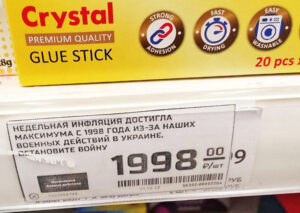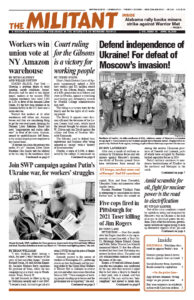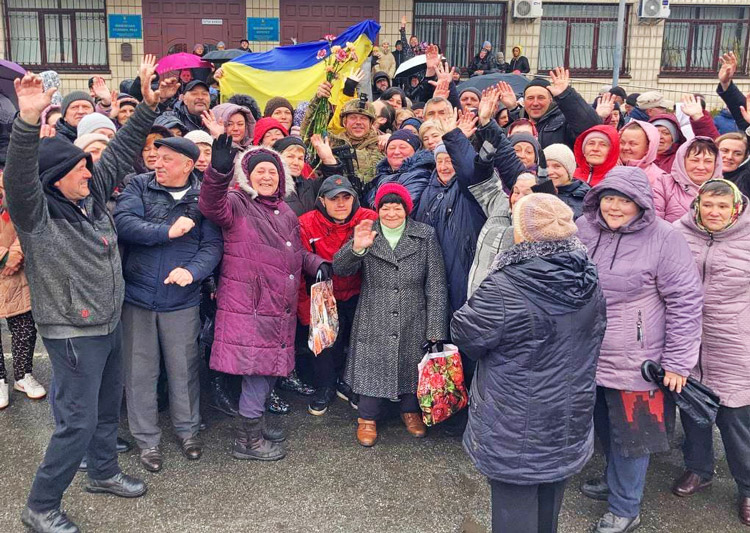After over a month of stubborn resistance by Ukrainian forces and volunteers against Moscow’s invasion, two-thirds of Russian ground forces have withdrawn from around the capital, Kyiv, and from Chernobyl, Chernihiv, Sumy and numerous other smaller towns.
Russian President Vladimir Putin is attempting to consolidate his forces further east, to focus his assault on seizing the eastern Ukrainian provinces of Donetsk and Luhansk, parts of which were occupied by Russian-backed separatist forces in 2014.
Putin’s military continues its murderous bombardment of Kharkiv in the northeast and Mariupol in the south.
The heroic battle by Ukrainian toilers for their national sovereignty continues, including a counteroffensive that helped drive the Russian forces away from Kyiv. And bold protests continue in Ukrainian cities under occupation in and around Kherson.
The Russian soldiers, who were told by Putin and his officer corps that they would be welcomed by Russian-speaking Ukrainians with vodka and open arms, were shocked at the ferocity of the Ukrainians’ fightback. Many refused to fight or crippled their military vehicles. Large columns, especially north of Kyiv, bogged down and stopped for lack of supplies, fuel and food. As they leave Ukraine now, the Washington-based Institute for the Study of War reports these soldiers “are highly unlikely to be effectively deployed elsewhere in Ukraine and are likely a spent force.”
After Russian troops pulled out of Bucha, a suburb of Kyiv, evidence mounted that some of them had engaged in killings and abuse of residents. Special forces from Chechnya were part of this deployment. Photos showed bodies of villagers shot in the head with their hands tied behind their backs with white cloth. Mayor Anatoliy Fedoruk told the press the Chechens had forcibly tied up their victims. These photos were run on the front pages of newspapers across the U.S. and worldwide April 5.
This human carnage was cynically grabbed by the capitalist rulers in Washington and across Europe to ramp up expansion of their militaries, justify further crippling sanctions that hit the working people of Russia the hardest, and to bolster their campaign to blame Russia’s working people for Putin’s slaughter.

In fact, in the face of harsh legal bans on protests against the war imposed by Putin, anti-war actions of all kinds by ordinary people still take place across the country. Police arrested over 200 people during anti-war demonstrations in 17 cities April 2. This is despite some 15,000 protest leaders already being imprisoned.
The average monthly salary last year in Russia was 56,545 rubles ($670). Since sanctions began, the prices of staple vegetables for traditional borscht have risen by 20%.
Working people are turning to growing their own in face of the soaring prices. Mike Bazhenov, 30, a software developer in Krasnoyarsk, Siberia, told the April 5 Wall Street Journal that he is helping relatives plant potatoes on their farm 500 miles away. That way, in case of severe shortages, he can get to their farm for food.
Still, Bazhenov said, his economic worries pale into insignificance compared with what is happening to people in Ukraine.
Protests continue in occupied cities
A protest against the occupation of the southern Ukrainian city of Enerhodar, the site of Europe’s largest nuclear power plant, was fired on by Russian forces April 2, with four injured.
In occupied areas, Russian detachments have abducted mayors, protesters and journalists in their efforts to suppress popular resistance.
Kostiantyn Ryzhenko, a journalist who publicized the daily protests against Russian forces in Kherson, disappeared March 30. In an armed raid on his family’s home his brother was taken hostage.
These demonstrations are “contradicting the Kremlin’s narrative and thwarting the attempts to stage yet another pseudo referendum” to try to set up a fake “Kherson people’s republic,” Halya Coynash of the Kharkiv Human Rights Protection Group wrote April 2.
Students and staff at a technical college in Vynohradiv that usually trains electricians, plumbers and other skilled workers, have turned the school into a small factory. They churn out defensive equipment like anti-tank traps and bulletproof vests. At another school volunteers weave camouflage nets.
In occupied Melitipol and elsewhere, Russian military police are trying to impose reeducation programs. They are destroying archives and books on everything from the history of Stalinist-era repression to the popular Maidan uprising that overthrew pro-Moscow President Viktor Yanukovych in 2014. Moscow had earlier suggested part of a “peace” settlement would include Yanukovych returning from exile to replace Volodymyr Zelensky as president.
The Kremlin tries to hide the scale of its army’s heavy losses. Moscow has been forced to mobilize 60,000 reservists and is recruiting mercenaries from forces it organized in Syria to back dictator Bashar al-Assad there.
As one Russian elite unit, the 331st Guards Parachute Regiment, advanced towards Kyiv it lost scores of soldiers, including its commanding officer. The BBC listed the names of 40 killed as of March 13 and who are now buried in Kostroma, the regiment’s base, 180 miles northeast of Moscow. The losses exceed those the unit suffered from its involvement in the Soviet occupation of Afghanistan and Moscow’s intervention in Chechnya.
It’s traditional in Russia for family members to post memorial messages for soldiers killed in combat. Some family members of those in the 331st are raising questions about Putin’s war. One said, “When will this end? When will people stop dying?” and another exclaimed, “Kostroma has lost so many young men, what a tragedy!”
Another woman wrote: “Why aren’t children of MPs on the frontline? The majority of them live in Europe anyway. Ordinary boys are dying for no good reason.” Another curses Putin, saying that in his decision to “play war” he has “sent thousands of guys to die.”
One Russian defense lawyer, Mikhail Benyash, told the Financial Times April 1 about a case he is handling filed by national guardsmen who are challenging their deployment to Ukraine. After Benyash publicly announced he would defend them, his office was inundated with calls from over 1,000 people across the country seeking his services.


